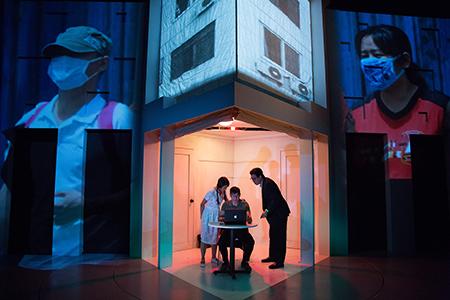‘Chimerica’: U.S, China in a Haunting Embrace
By • October 15, 2015 0 1178

The haunting, embracing play “Chimerica” by the young, gifted British playwright Lucy Kirkwood is ambitious, swiftly paced as well as sharply and intelligently written. It is a long, powerful offering about the fate of two modern nations as embodied by a moment in history, given a smart and swiftly paced production at the Studio Theatre with artistic director David Muse at the helm.
About the only thing that “Chimerica” isn’t is a part of the massive ongoing Women’s Voices Theater Festival, which features around 50 world premieres, all written by female playwrights throughout the Washington theater community. Technically, “Chimerica” isn’t a world premiere, although it is the work of Kirkwood, probably the hottest young playwright in Britain right now. The play–with dozens of scenes dealing with 23 years in the history of American-Chinese relations–was a smash hit in the West End. In any case, Studio also world-premiered “Animal” by Clare Lizzimore Sept. 30 as its WVTF entry.
At well over three hours, “Chimerica” is a challenge, for actors, for Muse and certainly for the audience. It runs from 1989—when a fledgling (and fictional) American photographer manages to shoot the iconic image of a young Chinese activist with a shopping bag defying a row of tanks in Tiananmen Square—to 2012, when that same photographer, by now disillusioned, is covering a presidential campaign while wondering whatever happened to what the world described as “tank man.”
The question soon turns into a compulsive, obsessive search for the identity of the man who performed a clean act of moral courage, the kind of act he sees as missing from his own life and the world. Soon enough, that search consumes him, to a fault, while in China, an old friend of his, still grieving over the death of his wife, watches as a neighbor dies a painful, lingering death from the withering effect of pollution, a by-product of resurgent China’s powerful economy. We follow a small army of characters, Joe the overbearing photographer, his friend Zhang Lin, as he alerts Joe about the pollution through e-mails and gains the attention of the Chinese party police, much to the consternation of his brother, Joe’s fellow conflict zone photographer, his boss at a publication which, by all accounts, stands for the New York Times and Tessa, an attractive British marketing consultant drawn to the hyper Joe.
Lots of thematic balls are in the air—the overarching progress of Chinese-American relations, the power and meaning of images in the internet world, the need for heroic figures and heroes, the difficulty of dealing with love in a helter-skelter atmosphere, the clash of cultures and politics, the desire for fame and meaning at the same time.
In some ways, even with its great length, “Chimerica” is decidedly cinematic. It functions as a dangerous political thriller, a mystery, a tough play written with both intelligence and humor, and a tolerant, even generous, empathy for all of its characters.
You’d think there would be lag time in a play like this, but Muse has directed with a keen sense of sharp scenes and pacing, aided by a set that uses two box-like constructions to serve as everything from a one-room apartment in Beijing, an art gallery, back alleys and sophisticated New York party settings, aided vividly by imaginative projections. It’s a kind of immersion for an audience in search of intelligent, engaging new plays and productions, and “Chimerica” lets the audience engage with the material, because everyone involved seems fully engaged as well.
One of the hallmarks of Studio productions under Muse is a focus on acting and actors, which may come as no surprise that the theater is the site of the Studio Acting Conservatory, still headed by founder and former artistic director Joy Zinoman.
In a large cast, Ron Menzel has the most difficult task in portraying Joe, who is easily the most frustrating, bombastic, annoying character in the play. Joe has a typically American moral arrogance, a self-immersed energy, a dose of paranoia, engaging in a reckless pursuit of a truth that may not after all be worth knowing in the larger scheme of things. But he has a presence that is undeniable and which serves him well, given that Joe is the engine driving the plot like a, well, tank, with almost a similar effect. But Rob Yang, as the mourning Zhang Lin is the heart of the play, he inhabits a sadness mixed with humor and courage that in its own way is as reckless as Joe’s in terms of its results.
Tessa Klein gives a rueful, sexy quality to a young woman who wears her insecurity on her cocktail dress sleeve, hard-living, and appealing. There are other fine turns—the veteran local actor Paul Morella as Joe’s editor, a knowing resignation by Lee Sellars as Joe’s fellow action junkie, a sympathetic turn by Kenneth Lee as the much-put-upon brother of Zhang Lin, among many others.
Kirkwood, in “Chimerica,” which won the Laurence Olivier and Evening Standard Award for Best Play in 2013, has a certain audacity in this play. She has an intelligence that gives the audience a gift by inviting into the world we live in—quite an amazing amount of it. If the ending may not be as surprising as it should be, it still packs a jolt, a shot to the heart.
“Chimerica” may not be a part of the festival, which is bringing us an abundant explosion of the work of talented female playwrights, but Kirkwood is surely one of the most talented playwrights working today. That’s worth celebrating and checking out.
“Chimerica” runs through Oct. 18 at Studio Theatre, 1501 14th St. NW.
- Kelsey Wang, Rob Yang, and Kenneth Lee in “Chimerica” at Studio Theatre. | Photo by Igor Dmitry
- Garrett Faulkner
- Garrett Faulkner




